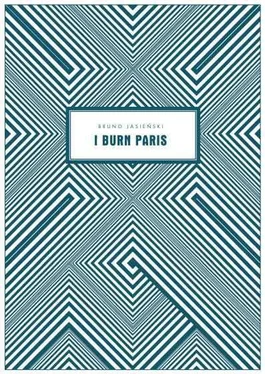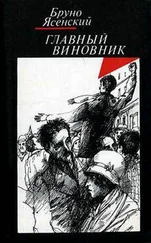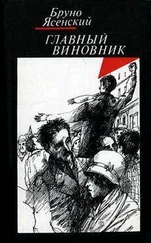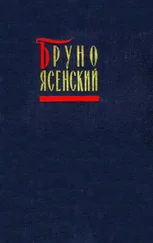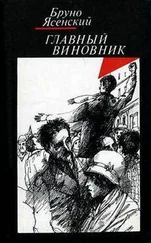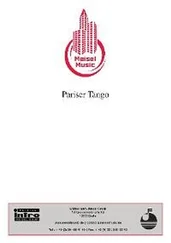Бруно Ясенский - I Burn Paris
Здесь есть возможность читать онлайн «Бруно Ясенский - I Burn Paris» весь текст электронной книги совершенно бесплатно (целиком полную версию без сокращений). В некоторых случаях можно слушать аудио, скачать через торрент в формате fb2 и присутствует краткое содержание. Город: Prague, Год выпуска: 2012, ISBN: 2012, Издательство: Twisted Spoon Press, Жанр: Классическая проза, на английском языке. Описание произведения, (предисловие) а так же отзывы посетителей доступны на портале библиотеки ЛибКат.
- Название:I Burn Paris
- Автор:
- Издательство:Twisted Spoon Press
- Жанр:
- Год:2012
- Город:Prague
- ISBN:978-80-86264-37-0
- Рейтинг книги:5 / 5. Голосов: 1
-
Избранное:Добавить в избранное
- Отзывы:
-
Ваша оценка:
- 100
- 1
- 2
- 3
- 4
- 5
I Burn Paris: краткое содержание, описание и аннотация
Предлагаем к чтению аннотацию, описание, краткое содержание или предисловие (зависит от того, что написал сам автор книги «I Burn Paris»). Если вы не нашли необходимую информацию о книге — напишите в комментариях, мы постараемся отыскать её.
I Burn Paris — читать онлайн бесплатно полную книгу (весь текст) целиком
Ниже представлен текст книги, разбитый по страницам. Система сохранения места последней прочитанной страницы, позволяет с удобством читать онлайн бесплатно книгу «I Burn Paris», без необходимости каждый раз заново искать на чём Вы остановились. Поставьте закладку, и сможете в любой момент перейти на страницу, на которой закончили чтение.
Интервал:
Закладка:
Now this was a surprise! He’d recognized Pierre at once, though it had been some time. How could he not recognize a childhood friend? True, he’d changed a good deal. In fact, he had heard long ago that Pierre was in Paris, but there had been no way of tracking him down. He’d heard some rumors… Truth to tell, he wasn’t looking so hot. Out of work, huh? He’d heard. He was going to have to get by somehow. Above all, he couldn’t go plopping himself down here, on this bench. If he didn’t have an apartment, he could stay with him for the time being. For his part, he couldn’t complain. He was getting by all right. He worked as an attendant in a bacteriological institute. Easy work, an apartment, days off. Pierre could have a look for himself. He lived nearby. They’d be there in a moment.
Pierre mutely and obediently wandered down the unfamiliar streets, dragging his feet, following the yarn of the unexpected voice, the ball of which he had lost (so long ago!) at the bottom of a green village well he knew from his childhood.
VIII
The unpredictable roulette of fortune had spent hours stubbornly skipping past the baleful number on which the gambler-fatalist had staked it all, stripping him in turn of his possessions, his convictions, and his woman, things that could not be won back, until finally, his shirt already lost, when he was just getting up to leave the table, the ball hit the long-awaited number – but as usual, it was too late.
Pierre found work. A water tower at a city filter station in Saint-Maur. From eight to six. Every morning the stuffy, packed suburban trolley car. A narrow, eight-cornered room with bird-patterned wallpaper on Boulevard Diderot. Breakfasts and lunches. The long, slender sticks of bread rolls, vanishing into the insatiable orifice of the mouth, like firebrands down the gullets of fairground jugglers. Warmth and sleep.
In the evening, having returned from work, Pierre lay for hours stretched out on his soiled mattress, relishing the passive pleasures of digestion, his gaze fixed absently on the uncomplicated arabesques of the wallpaper. Freed from the tyranny of the mind, his gaze devoted itself to pure, useless creativity, industriously combining random fragments of patterns – the beak of a bird torn from its head, leaves from a branch, and the immaterial smear of a shadow – into the contours of human figures, fantastical, predatory profiles, a new realm of objects, unsettling and surreal.
In the depths of his idle consciousness, congealed motionless like a cornfield on a windless, scorching Indian summer afternoon, lurked the vague, hollow presentiment of an open wound, deep and black as a mine shaft. His languid thoughts, drifting on the surface like lazy gusts of wind, instinctively tiptoed past this spot, as if afraid that one misstep would send them hurtling into the void. Left to its own devices, his vision assembled shifting outlines from cutout fragments, and some blind internal instinct kept it from merging the treacherous contours into a certain faded feminine profile.
On the first Sunday, Pierre was visited by a ruddy René, the accidental perpetrator of his recent prosperity, who invited him out for a stroll around the city.
The inactive, dusty tedium of the day off made the streets teeming, stifling, and dull. It was the part of the Parisian summer following the Grand Prix, when the last corpuscles of blue, or even dyed-blue blood evaporate from the heated body of Paris along with the sweat and water, condensing in receptacles seemingly built for that very purpose – Dauville, Trouville, and Biarritz – and Paris’s blood takes on a color that is decidedly red, the red of the urban working-class parvenu.
It was the eve of July 14, Bastille Day, and tricolor flags and paper lanterns were hastily strung about the city. The streets were flooded with crowds in festive attire, giving off that special odor of a French holiday: cheap wine, tobacco, and democracy.
After meandering a few hours, Pierre and René found themselves before the gates of the institute, where René was to work a night shift. The institute was empty. A damp chill blew from inside, and with it a complex smell of chemicals, such as one finds in country pharmacies.
René offered to show Pierre the laboratory.
Up a wide, stone staircase, dark as a tunnel, they went.
The laboratory was filled with the same rejuvenating chill. Along the walls, from the depths of cabinets, strange, unknown creatures made of glass and steel stared out at Pierre with one thousand glassy eyes. Their mysterious shapes filled him with apprehension.
René returned a moment later in a white laboratory smock.
He was one of those creatures, at once simple and complex, encountered most frequently on the lowest rung of the social ladder, in whom constant, direct contact with a hermetic world of objects had developed, unbeknownst to those around him, a sixth sense – a sense of forever foreign, silent matter – often found in those spending long periods of time among deaf-mutes.
Living in this practically irreal world – a transparent world of glass, of fantastic, inconceivable apparatuses – as though it were a normal environment, René could glean the unique individuality of objects, sense it in even identical objects, mass produced to appear the same to us, much like the faces of Europeans appear identical to a black man from Senegal.
Holding them gingerly every day, dusting and polishing them, René shuddered in fear as he registered their fragile lives, which dangled on one careless move of his coarse fingers. Taking root in him was a horrible instinct of responsibility for the preservation of this illusory world of helpless and mysterious creatures left to the mercies of his unschooled hands.
Whenever he happened to smash one of the instruments entrusted to his care, he suffered it more than he would have the death of a living creature.
When one of the institute’s laboratory assistants – a person he got along with splendidly and who even showed him empathy – poisoned himself one day on a microbe and died in terrible agonies, René appeared to show not the slightest grief; on the contrary, it seemed to give him malicious satisfaction. The assistant had had the ill fortune to break one of the retorts the previous day, something that René had been unable to forgive. He believed in his heart of hearts that the assistant’s demise was his just deserts.
This in no way altered the fact that René had an exceptionally good heart and would not have harmed a fly.
Collecting the fragments of the broken instruments and trying in vain to piece them back together, René bitterly thought:
“Let men harm one another – a man is no loss! A man can defend himself. A thing is a different matter. Only a scoundrel would harm a thing. A thing is defenseless.”
This feeling of innate responsibility for the lives of hundreds of these fragile creatures outweighed his human sentiments.
In moments of great cataclysms and revolutions people of René’s ilk are capable of the greatest acts of heroism and devotion to the safety of an endangered machine, while watching with indifference as human blood is spilled before their eyes.
That awareness of constant responsibility for the life of a miniature world, over which he felt himself lord and caretaker, nevertheless filled René with a deep sense of pride and a feeling of personal significance, which his colleagues clearly derided. In the fictitious hierarchy of this world’s administrators, René was a person of the lowest grade.
The whole afternoon’s visit and stroll about town was all in all a carefully planned maneuver to get Pierre, offhandedly as it were, to the door of the institute, to dazzle Pierre with his miniature kingdom.
Читать дальшеИнтервал:
Закладка:
Похожие книги на «I Burn Paris»
Представляем Вашему вниманию похожие книги на «I Burn Paris» списком для выбора. Мы отобрали схожую по названию и смыслу литературу в надежде предоставить читателям больше вариантов отыскать новые, интересные, ещё непрочитанные произведения.
Обсуждение, отзывы о книге «I Burn Paris» и просто собственные мнения читателей. Оставьте ваши комментарии, напишите, что Вы думаете о произведении, его смысле или главных героях. Укажите что конкретно понравилось, а что нет, и почему Вы так считаете.
